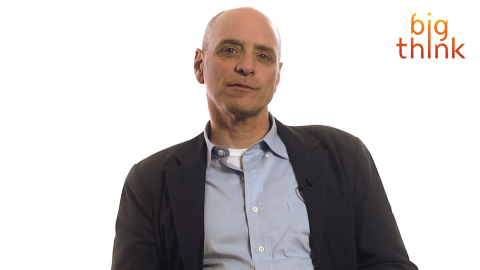Eric Schlosser Talks Agriculture and Human Rights Abuses

Last week, filmmaker Sanjay Rawal discussed his new documentary Food Chainsin a Big Think interview. Rawal spoke about “fair food,” items from your grocery guaranteed to have been harvested under fair, ethical conditions. The subject of Food Chains is specific group in Florida — the Coalition of Immokalee Workers — that has made large strides in guaranteeing safe and healthy working conditions for its laborers.
Today our focus is on author and investigative journalist Eric Schlosser, who served as executive producer on the film alongside actress Eva Longoria. Schlosser has written at length on the many injustices of the American food industry. He touches on a number of those subjects in his latest Big Think interview:
“One of the problems with our food system… it’s ultimately based on the exploitation of poor workers, mainly recent immigrants in this country. That’s true when you look at the restaurant industry and fast food workers. It’s true when you look at the meatpacking industry and who’s working in their processing plants. But it’s especially true in the production of fresh fruits and vegetables. Just about every healthy fresh fruit and vegetable produced in the United States is still harvested by hand and the people who are harvesting our healthiest foods are being paid poverty wages and exploited.”
Schlosser notes that the rise of vegetarianism and veganism over the past couple decades can in part be tied to the inhumane treatment of animals in the meatpacking industry. Yet in order to maintain a healthy diet of fruits and veggies, Americans become inextricably linked to a system built on the exploitation of laborers who lack the social capital to defend themselves.
Today’s system of exploitation is different from the one rallied against by Cesar Chavez, Dolores Huerta, and the United Farm Workers. Where 40 years ago the blame for unacceptable worker conditions could be laid on farmers and growers, today the culprit is much higher up the food chain:
“But today it really isn’t the farmers and growers who have power over their workforce. It’s the companies at the top of the food chain and that would be the big fast food companies, the big supermarket chains which are the largest purchasers of these agricultural products. And they squeeze their suppliers all the way down the line. And at the very bottom, literally at the bottom of this pyramid are the workers, the workers in the field. And they’re the ones whose wages are being cut and whose working conditions are suffering in order for the fast food companies and the big supermarket chains to make a little bit of extra profit.”
In order to secure safe, healthy, non-exploitative working conditions, workers are doing their best to organize their collective power to force the big dogs at the top to prioritize ethics over profit. The Coalition of Immokalee Workers is key example. Their efforts have put a dent in a system that encourages labor atrocities beyond what most Americans would expect:
“It’s sort of incredible in the twenty-first century that there would be slavery. Literally slavery in the fields as undocumented workers are basically traded by their smugglers to labor contractors and forced to work for free. And in the twenty-first century this may seem like a radical view but we shouldn’t have slavery in the United States. And I think most people don’t realize how bad these working conditions are in agriculture and the fact that, you know, there’s still systems of indenture that are more reminiscent of the mid-nineteenth century than they are with the twenty-first century.”





